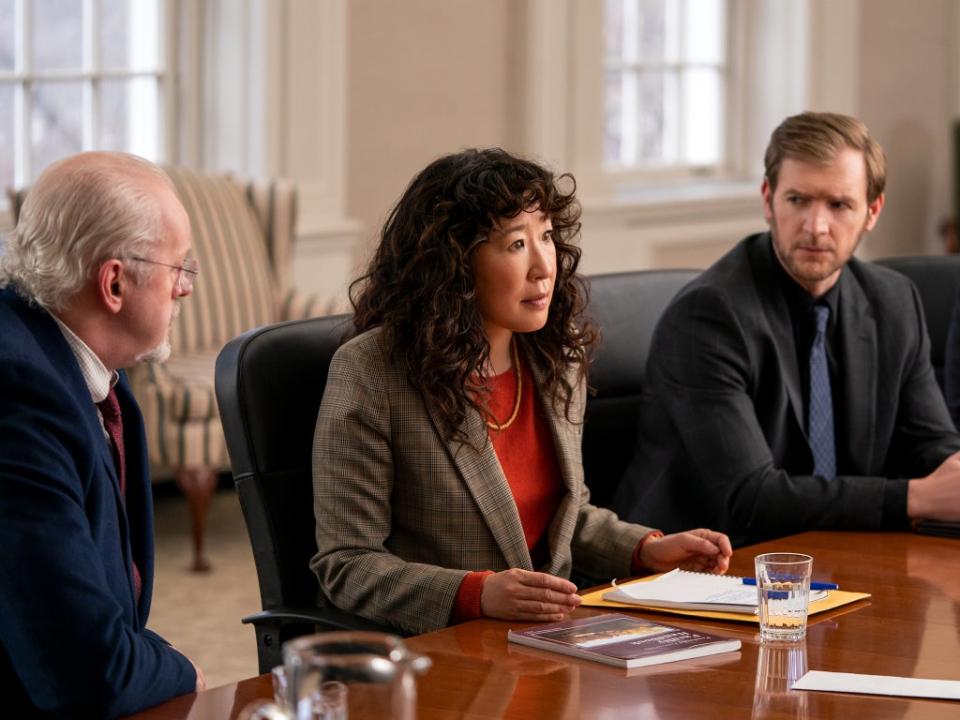The Chair review: Sandra Oh college drama outstrips its expected grades
I’m probably biased as it was my degree, but setting a TV series in a university English department seems brave verging on kamikaze. Reading all those poems and plays and novels is bad enough, let alone watching people talking about reading them. The stakes could hardly be lower. Who will get tenure? Who will be cancelled? Will the teaching of Chaucer survive the 21st century? Who cares? As premises go, it’s not exactly “teacher turns to crystal meth” or “drug kingpins in Baltimore” or even “1950s advertising agency”.
So it’s a happy surprise to report that Netflix’s The Chair outstrips its expected grades. It’s a drama-comedy – isn’t everything these days? – set at the fictional Harvard-Yale-Princeton-type college, “Pembroke”. Rather than the students who are trying to find their place in the adult world, these six half-hour episodes focus on the faculty, trying to find their place in the new and often bewildering student world.
After her blockbuster turn as the flustered-but-brilliant intelligence agent Eve Polastri in Killing Eve, Sandra Oh stars as the flustered-but-brilliant academic Dr Ji-Yoon Kim. At the start of the first episode, she has been appointed as chair of the department, the first woman of colour to hold the position.
One of several refreshing qualities in The Chair is that it puts the ostensible outsider immediately in a position of authority. The question for Dr Kim is not how she’ll gain power, but how she’ll wield it. Her predominately pale, stale and male older colleagues find themselves working in an increasingly hostile environment. The undergraduates don’t want to come to their lectures, favouring sexier lectures given by younger staff, like Yaz McKay (Nana Mensah), who encourages her students to rap about Moby Dick. What’s more, at any moment they might be put up on social media doing, saying or thinking something wrong. Trying times.
The rogue element in all this is Bill Dobson (Jay Duplass), a widowed writer and lecturer with a foot in both camps, in that he is charismatic, handsome and popular, but he’s also a straight white man. He is also recently widowed, prone to getting drunk and waking up in strange places, and has a difficult relationship with his college-aged daughter. Kim wants him to succeed, but he has a habit of self sabotage. Duplass, probably best known for Transparent, has easy chemistry with Oh, and we feel Kim’s conflict as she weighs up a relationship with him. He might make a father figure for her troubled adopted daughter, Ju-Hee (Everly Carganilla), but equally Kim might have to be a mother for him.
The script, by the actor and executive producer Amanda Peet, takes care to avoid obvious young-vs-old traps. The veterans might be fusty, but they are still experts. If Dr Kim truly believes in her subject, she’ll find a way for everyone to get along, and remind the students, and her university bosses, that there is still value locked away in these creaky old synapses. They don’t make her job easy. When Chaucer maven Joan Hambling (a brilliant Holland Taylor) goes to seek legal recourse about her office being moved to the “wellness centre”, she is obstructed by a scantily clad assistant, Sarah (Havana Rose Liu).
“Truth is a very loaded word,” Sarah says, casting doubt on Joan’s accusation.
“Is it, though?,” replies the old professor, keen to remind this whippersnapper that her generation didn’t invent feminism. “If something’s true, there’s no moral weight applied to it. It’s a mere statement of fact. For example, it would be true for me to say everyone can see your fanny.”

There are a few gleaming little daggers like this, but if anything lets The Chair down it’s that it rounds off too many of its sharp edges. Today’s students are appealing targets: glued to their phones, quick to condemn, and reluctant to give their lecturers anything resembling the benefit of the doubt. Perhaps as the series goes on it will grow in confidence. If there’s one thing a university education is meant to teach, it’s that students need to learn to take it as well as dish it out.
Read More
The lads are not alright: Why are male adolescents turned into cultural whipping boys?
The White Lotus review: This nightmarish vision of paradise is the comedy of the year


